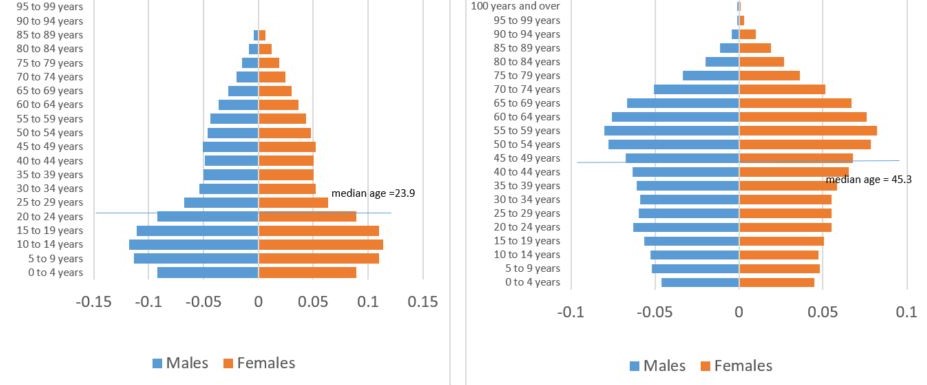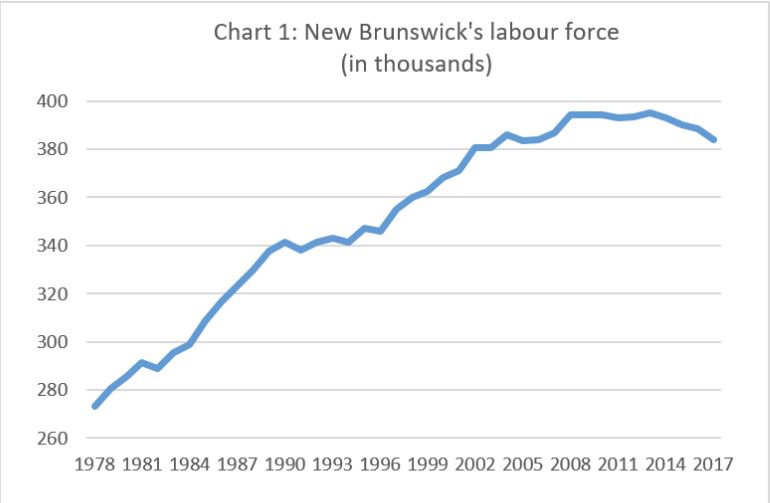New Brunswick’s population ‘time bomb’ lends urgency to province-wide talks on immigration
Forty years ago, the province of New Brunswick’s labour force was growing at a rate of nearly 4,000 people a year. Now it’s shrinking by almost the same amount.
Economist and author Richard Saillant says it’s only due to the roughly 1,000 immigrants now coming into New Brunswick each year that the province’s workforce isn’t decreasing by 4,000 people a year.
“If you wanted to stabilize the workforce, we’d need another 2,800 to 3,000 people annually — and that’s just to stabilize things so the workforce no longer shrinks,” Saillant told CIC News.
The big reason for New Brunswick’s declining workforce is the fact that more residents are now retiring from the labour market than those working or looking for work. A similar trend is occurring in Canada's other Atlantic Provinces, and across the country.
A third of New Brunswick’s population was born during the baby boom years spanning 1946 to 1965 and many are now hitting their retirement years. The province now has more people over the age of 65 than it does children under the age of 15.
New Brunswick Age Pyramids, 1971 and 2017

Source: Statistics Canada, CANSIM, table 0510001. Courtesy of New Conversations NB.
The loss of workers is having a big impact on New Brunswick’s economic growth, reducing it to a mere 0.5 per cent annually in recent years. That, in turn, is slowing the growth of New Brunswick’s tax base at a time when the health care and social service needs of its aging population are on the rise.

Richard Saillant.
“Although we are making some progress in terms of drawing newcomers, we need a quantum leap here,” Saillant says. “It’s not just fiddling at the margins ... public spending on health care is about to climb quite dramatically in the years ahead.”
Saillant and fellow economist David Campbell are now on a mission to raise awareness in communities around the province about New Brunswick's demographic crisis and the vital need to increase immigration levels.
“Everyone is aware of the challenge — at this point, it’s a process of gaining familiarity, that’s the key,” Saillant says. “It’s my job as an economist to help them understand that, rather than stealing your job, immigrants are actually key to sustaining your job. If employers can’t find workers, all of the factory is at stake … immigration is the very basis for sustainability here in terms of employment in the years ahead.”
Winning hearts and minds
Called "New Conversations," the economists' 15-city tour is organized by the New Brunswick Multicultural Council (NBMC).
Alex Leblanc, executive director of the NBMC, said the communities on the New Conversations tour were selected because they are either currently experiencing significant immigration or have been identified as having a need for significant immigration in the future.

Alex Leblanc.
“These are 15 unique communities from across the province, all with different demographic realities, different labour market realities and different industries,” Leblanc told CIC News. “They are also communities that aren’t typically involved in these conversations.”
Portraits of the local demographic and economic realities prepared by David Campbell guide the meetings, which hear from members of the local business community and immigrants who settled in the area.
“People in attendance get both the big 'why' from Richard or David and the human side from employers and local newcomers,” Leblanc explained. “We’re trying to reach out to the head and heart because this is not just about numbers and economics; it’s a much more dynamic and complex undertaking. These are human beings.”
Leblanc said the meetings are having the desired effect and pointed to the conversion of a outspoken critic of immigration during New Conversation’s stop in the city of Edmunston.
“They were in the room and at the end of the day signed up to volunteer,” Leblanc said. “They said they were transformed by the stories they heard.”

Source: Statistics Canada, CANSIM, table 2820002. Courtesy of New Conversations NB.
Also vital are the changes Leblanc says he’s observed in how local officials view their city’s role in the immigration process.
“We’ve had mayors come to the presentation wanting to know what more the province could do and the service providers could do to improve the situation, and they left asking themselves how they and the city, their municipality, can play a leadership role on this file,” he said.
“People are coming with certain assumptions, and they’re leaving with greater engagement, a greater sense of priority around this.”
Building a more diverse New Brunswick
Mohamed Bagha, managing director of the Saint John Newcomer Centre, said the New Conversations tour is essential given the “demographic time bomb” that New Brunswick is facing.

Mohamed Bagha.
Bagha’s organization is one of the local groups that are partnering with the NBMC on its New Conversations tour. While the number of immigrants his organization assists is increasing every year, he says New Conversations is needed to help prepare New Brunswickers for the fact the province will have to open its doors even wider in the years ahead.
“Many industries are looking for employees — I met with two employers today are looking for people and who are planning for integrating new New Brunswickers in the workforce,” he told CIC News.
Bagha says increasing immigration will also have the added bonus of bringing more diversity to a province where currently only four per cent of residents are born abroad.
“We need a conversation around the importance of a culturally diverse community,” Bagha says. “It’s like a garden — when you have a garden with just one flower, it doesn’t sustain the soil. When you have many flowers and plants, it looks beautiful and it sustains the soil.”

The City Market in Saint John, New Brunswick.
Leblanc said the lessons coming out of the New Conversations series will be of value not only to New Brunswick, but to communities across Canada that are facing a similar future.
“This is an issue for rural regions and small and mid-sized cities all across the country will be struggling with this issue in the years to come,” Leblanc said. “The work that we do here in New Brunswick around engaging local communities and improving immigration processes and integration will help inform how we get this right in other regions across Canada.”
“The wave is hitting us first, and we’ll hopefully provide some optimism to other regions that this can be done.”
© 2018 CICNews All Rights Reserved
- Do you need Canadian immigration assistance? Contact the Contact Cohen Immigration Law firm by completing our form
- Send us your feedback or your non-legal assistance questions by emailing us at media@canadavisa.com






